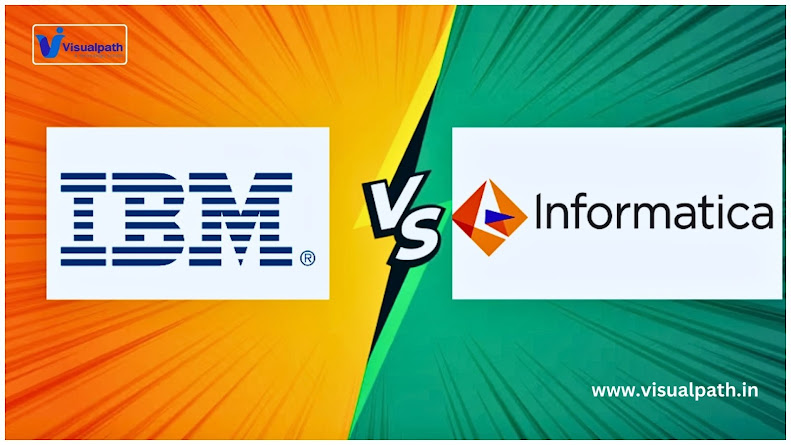- Get link
- X
- Other Apps
- Get link
- X
- Other Apps
IBM and Informatica are two prominent names in the realm of enterprise
software solutions, particularly in data management and cloud integration.
However, they cater to slightly different needs, each offering unique platforms
and tools. This content outlines the key differences between IBM and
Informatica to provide a clear understanding of their offerings and
capabilities. Informatica
Online Training
1. Company Backgrounds and Focus Areas
- IBM (International Business
Machines) is a global technology giant with a diverse portfolio that
spans from hardware to artificial intelligence, cloud computing, and data
management. IBM is well-known for its innovation in AI with Watson,
enterprise cloud services, and comprehensive data solutions under the IBM
Cloud and IBM Data and AI platforms. Its offerings focus on serving large
enterprises with complex IT needs.
- Informatica is a company that specializes
in data management, integration, and cloud services. Known for its Informatica Intelligent Cloud Services (IICS), the company’s core focus is on
data integration, data governance, and data transformation. Informatica
has positioned itself as a leader in cloud data management, offering
powerful tools for businesses to handle big data, cloud integration, and
AI-driven data analytics. Informatica Training Institutes in Hyderabad
2. Key Product Offerings
- IBM:
o IBM Cloud Pak for Data: This integrated platform uses IBM’s
AI capabilities and is designed for data and AI workloads. It offers a
comprehensive solution for organizations looking to streamline their data
collection, organization, and analytics processes.
o IBM Watson: A suite of AI tools and services
that help businesses apply machine learning and AI to various use cases,
including data management and analytics.
o IBM DataStage: A tool for ETL (Extract, Transform,
Load) that focuses on data integration at an enterprise level.
o IBM InfoSphere: A suite for data governance, data
quality, and master data management (MDM).
- Informatica:
o Informatica Intelligent Cloud
Services (IICS): A
cloud-native data integration and management platform designed for multi-cloud
and hybrid environments. It helps in ETL, ELT (Extract, Load, Transform), and
data transformation processes across various systems.
o Informatica Data Governance: A solution that enables businesses
to govern their data with AI-driven automation, focusing on data quality and regulatory compliance.
o Informatica PowerCenter: A powerful tool for on-premise data
integration, offering high scalability and performance for handling large data
volumes.
o Informatica MDM (Master Data
Management): Ensures
that businesses maintain a single, reliable view of their critical data across
the enterprise.
3. Cloud Integration Capabilities
- IBM: IBM Cloud offers a range of
cloud integration solutions that tie into their AI and analytics
capabilities. IBM is highly focused on hybrid cloud solutions, allowing companies to integrate cloud services with their existing
on-premise systems. IBM's partnership with Red Hat further strengthens its
cloud offerings, providing enhanced containerized solutions for
cloud-native applications.
- Informatica: Informatica’s IICS platform is
cloud-native, meaning it was designed from the ground up to run seamlessly
in the cloud. It supports integration across a wide range of cloud
platforms such as AWS, Azure,
and Google
Cloud, and offers tools for migrating data and applications to the
cloud. Informatica excels in making the cloud transition process smooth
with its data integration and governance capabilities. Informatica Cloud Data Integration Training
4. Artificial Intelligence and Automation
- IBM: IBM is a leader in AI, with its
Watson platform integrated into many of its tools. Watson brings advanced
AI and machine learning capabilities to data management, allowing
businesses to automate and improve data quality, analytics, and
decision-making processes.
- Informatica: While Informatica also
leverages AI through its CLAIRE engine, its focus is more on data
management, offering AI-driven insights for data integration, data
quality, and metadata management. Informatica’s AI capabilities are
primarily used to enhance automation and governance within the data
lifecycle.
5. Target Audience
- IBM: IBM primarily serves large
enterprises with complex IT ecosystems that require scalable, secure, and
flexible solutions. IBM's offerings are often geared toward organizations
with existing on-premise systems that are looking to adopt hybrid or
multi-cloud environments.
- Informatica: Informatica focuses on
businesses that need to manage, integrate, and govern their data across
cloud and on-premise environments. It caters to organizations of all
sizes, but its cloud-native tools make it especially attractive to
companies undergoing digital transformation.
Conclusion:
In summary, IBM and Informatica both provide powerful
solutions in the data management and integration space, but with different
strengths. IBM is strong in AI and
hybrid cloud services, while Informatica excels in cloud-native data
integration, governance, and data management. The choice between the two
depends on an organisation's specific needs regarding data volume, AI
capabilities, cloud strategies, and integration requirements. IICS
Training in Hyderabad
Visualpath
is the Best Software Online Training Institute in Hyderabad. Avail complete Informatica Cloud worldwide. You will get the best
course at an affordable cost.
Attend
Free Demo
Call on - +91-9989971070.
WhatsApp: https://www.whatsapp.com/catalog/919989971070
Blog Visit: https://visualpathblogs.com/
Visit
https://www.visualpath.in/informatica-cloud-training.html
iics
IICS Cloud Data Integration Online Training
IICS Online Training
Informatica Cloud Online Training
Informatica Cloud Training
Informatica Training in Ameerpet
Informatica Training in Hyderabad
- Get link
- X
- Other Apps

Comments
Post a Comment